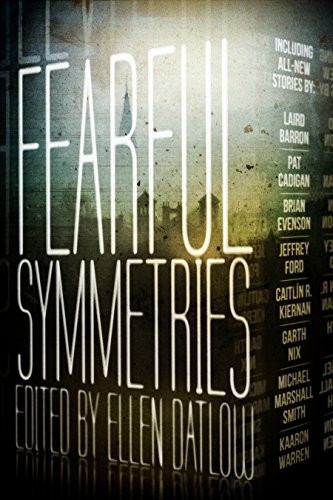Zack is reading... reviewed Fearful Symmetries by Ellen Datlow
Another excellent anthology edited by Ellen Datlow
4 stars
With Ellen Datlow editing, you are always guaranteed an anthology with quite a few excellent stories in it. Even the ones that may not grab you particularly are always at least interesting. Fearful Symmetries is no exception. The stories in this anthology that most grabbed me were:
"A Wish from a Bone" by Gemma Files
In my experience Gemma Files' stories often fall into either the realm of subtly disturbing, as her entry from The Doll Collection does, or full-throttle intensity. "A Wish from a Bone" is the latter type of story. It is also one of those horror stories that I think would translate very well to film.
"The Atlas of Hell" by Nathan Ballingrud
I had read Ballingrud's story "Skull Pocket" prior to reading this one. "Skull Pocket" is a macabre little gem for sure, but this is the story that convinced me to buy his collection Wounds: …
With Ellen Datlow editing, you are always guaranteed an anthology with quite a few excellent stories in it. Even the ones that may not grab you particularly are always at least interesting. Fearful Symmetries is no exception. The stories in this anthology that most grabbed me were:
"A Wish from a Bone" by Gemma Files
In my experience Gemma Files' stories often fall into either the realm of subtly disturbing, as her entry from The Doll Collection does, or full-throttle intensity. "A Wish from a Bone" is the latter type of story. It is also one of those horror stories that I think would translate very well to film.
"The Atlas of Hell" by Nathan Ballingrud
I had read Ballingrud's story "Skull Pocket" prior to reading this one. "Skull Pocket" is a macabre little gem for sure, but this is the story that convinced me to buy his collection Wounds: Six Stories from the Borders of Hell (which is excellent btw). I am a fan of genre crossovers and I think that crime and horror are two genres that cross over well when woven together by deft hands. "The Atlas of Hell" is one of the most memorable of the crime/horror crossovers I have read.
"The Window" by Brian Evenson.
This story is notably short and its prose notably spare, both of which are significant contributing factors in making it one of the most unsettling additions to this anthology. The sparse characterization of the protagonist creates the ability for the reader to easily insert themself into the story.
"Mount Chary Galore" by Jeffrey Ford
While I'm not sure I'd say this was one of my favorite stories in the anthology, it is one of the more striking. It certainly was the story that most surprised me. Gruesome fairy tale aspects are combined with a first person recollection of youth to great effect.
As a disabled person myself, I tend to analyze portrayals of disability in stories more closely than most readers might. I wouldn't say that the disability portrayal in this story is particularly good. To some extent it feels like the presence of Prettyplease, the disabled character in this story, is closer to being a plot device than anything else. There are inverse stereotypes of intellectual and developmental disability as both a marker of innocence and as a marker of dangerousness. The former tends for intellectually/developmentally disabled people to lead to infantilization and the latter to demonization. Both stereotypes can and do lead to some form of incarceration. Both stereotypes are present in this story and played against one another to create surprise in the reader. While that strategy is likely to work as intended on most readers, I can't say I think it is a particularly good or responsible way to portray disability. If I am completely fair, the people in the story who look down on Prettyplease as being of obviously lesser worth are clearly portrayed as lacking much of anything in the way of virtue or decency. However, I don't think that mitigates my aforementioned criticisms much. I do not think there is any conscious malice in this story toward disabled people. I'll grant that the author's intent here is almost certainly not to portray disability well and that many readers will not catch these problems, but I think my criticism is valid regardless of authorial intent and reader ignorance. After all, if both readers and writers didn't believe in some way of the ability of stories to shape perception and action, why would we bother with them?
"Suffer Little Children" by Robert Shearman
Near the beginning of this story, what I thought I was going to get from it was a rather sedate (by today's standards) Victorian ghost story in the vein of The Turn of the Screw. What this story actually is is an intense commentary on the inheritance of human viciousness through familial and societal lineages Of conformity. At least that's the way it reads to me. Don't let my interpretation make it sound like its stuffy though. It is not.
"Power" by Michael Marshall Smith
This story is honestly a bit unpleasant to read, as it's told from the first-person perspective of a first-class asshole business bro. It is also maybe the most cleverly told story in the anthology. The further the story progresses, the more you get the impression that the take-charge attitude and dismissal of the worth of other human beings that this fucko sees as a strength is gradually leading him to his just desserts. The ending of the story is a wicked little piece of schadenfreude that I enjoyed given current events.
"The Attic" by Catherine Macleod
Each first-person narrative in this anthology has its own distinct voice. The voice of Eleanor, the protagonist of this story, was one of the most compelling to me. Eleanor's background works in combination with the unsettling setting of the story and the irony at the story's core to make it one of the most memorable entries in the anthology. There are different types of families and each can have their drawbacks.
"Episode Three: On the Great Plains, in the Snow" by John Langan.
There are ghosts and a rampaging Tyrannosaurus Rex in this story. I don't need to say anything else, do I?
"Shay Corsham Worsted" by Garth Nix
This is one of those stories that strikes a very good balance between horror and humor, at least for me. It really was a perfect note for this anthology to go out on. It's horrific because if you remove the supernatural element, the world potentially ending because of the British intelligence service is uncomfortably plausible. It's also kind of hilarious because of course bureaucratic carelessness would be the thing that sets those final dominoes tipping.
I definitely recommend this book, as is the case with every other anthology edited by Ellen Datlow I've ever read. No matter what your preferred type of horror is, you will almost certainly find a few stories here that make your spine tingle or your stomach clench.

